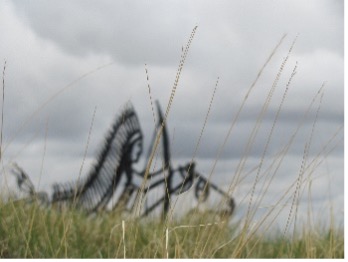As discussed in my last post, Black Elk, or Hehaka Sapa, is the most famous Oglala holy man of the nineteenth century. He was born free in December of 1863, and was with Crazy Horse and Sitting Bull at the Battle of the Little Bighorn. The following is a set of excerpts from the book Black Elk Speaks:

Everyone began sharpening knives and arrows and getting the best horses ready for the great making of meat.
Then we started for where the bison were. The soldier band went first, riding twenty abreast, and anybody who dared go ahead of them would get knocked off his horse. After them came the hunters riding five abreast. The people came up in the rear. Then the head man of the advisers went around picking out the best hunters with the fastest horses, and to these he said: “Good young warriors, my relatives, your work I know is good. What you do is good always; so today you shall feed the helpless. Perhaps there are some old and feeble people without sons, or some who have little children and no man. You shall help these, and whatever you kill shall be theirs.”
Then when we had come to where the bison were, the hunters circled around them, and the cry went up, as in a battle, “Hoka hey!” which meant to charge. Then there was a great dust, and everybody shouted, and all the men went in to kill. They were all nearly naked, with their quivers full of arrows hanging on their left sides, and they would ride right up to a bison and shoot him behind the left shoulder. Everybody was very happy.
All over the flat, as far as I could see, there were men butchering bison now, and the women and the old men who could not hunt were coming up to help. And all the women were making the tremolo of joy for what the warriors had given them. That was in the Moon of Red Cherries [July]. It was a great killing.
This is the story of all life that is holy and is good to tell, and of us two-leggeds sharing in it with the four-leggeds and the wings of the air and all green things; for these are children of one mother and their father is one spirit.’